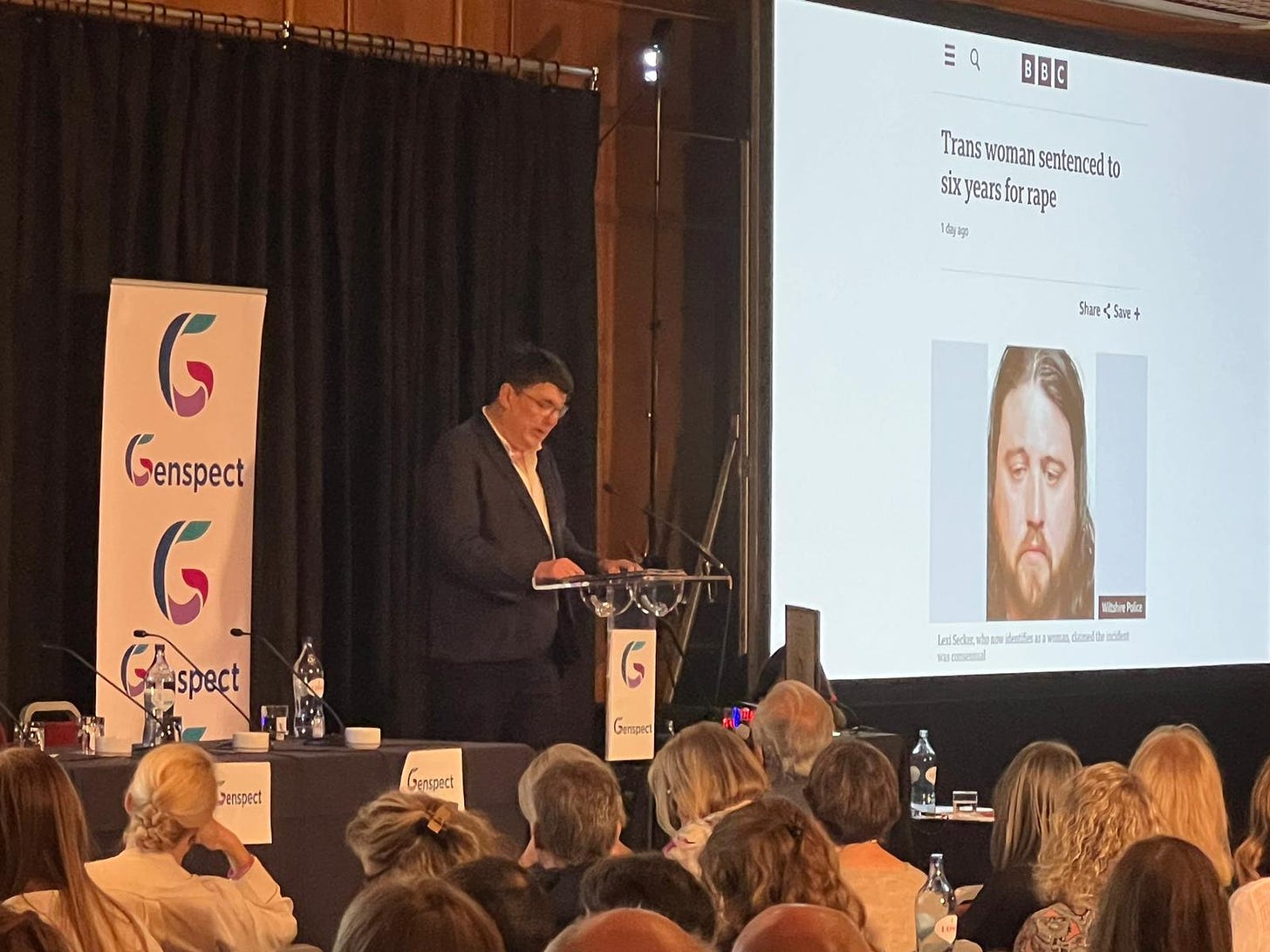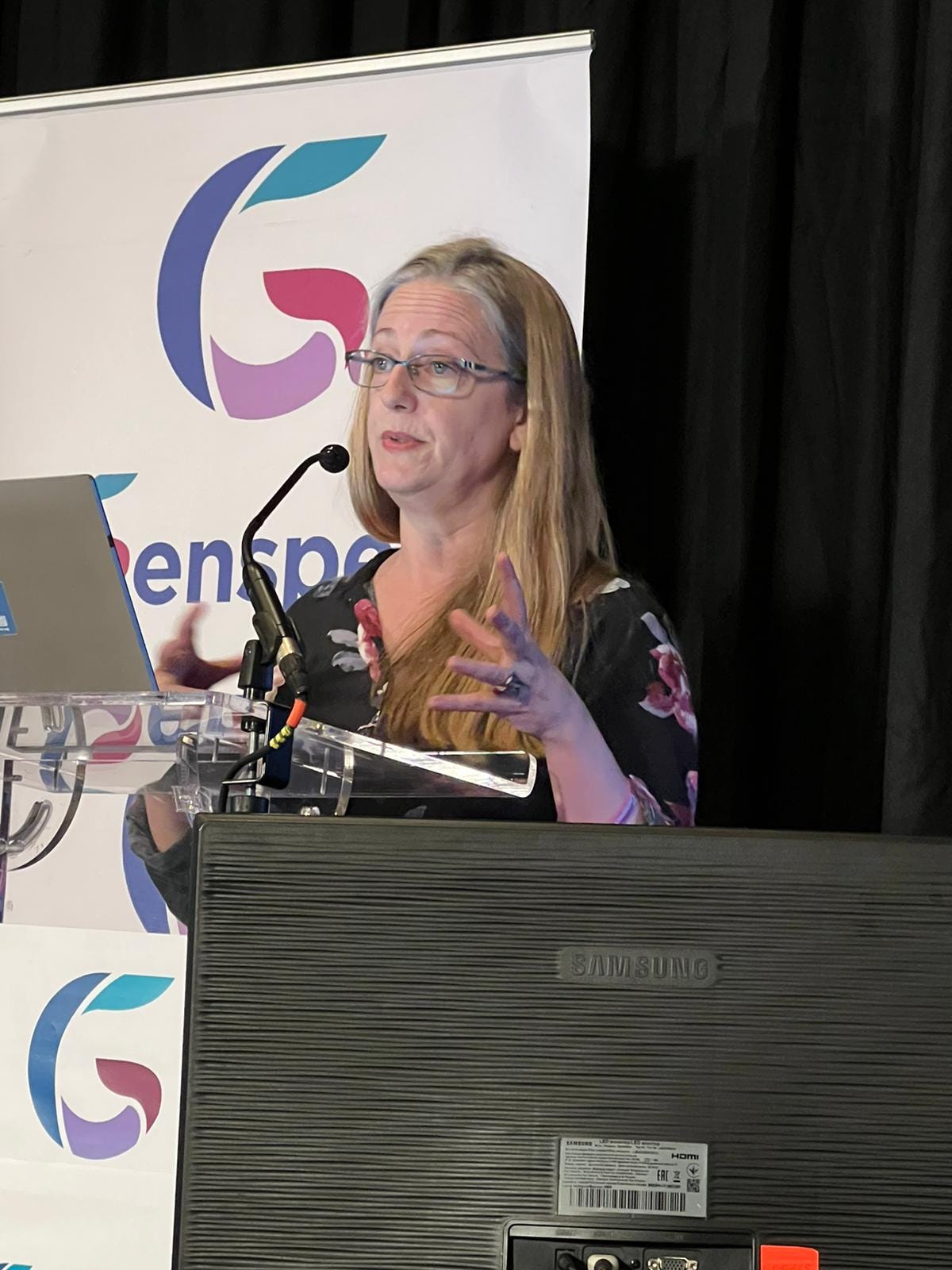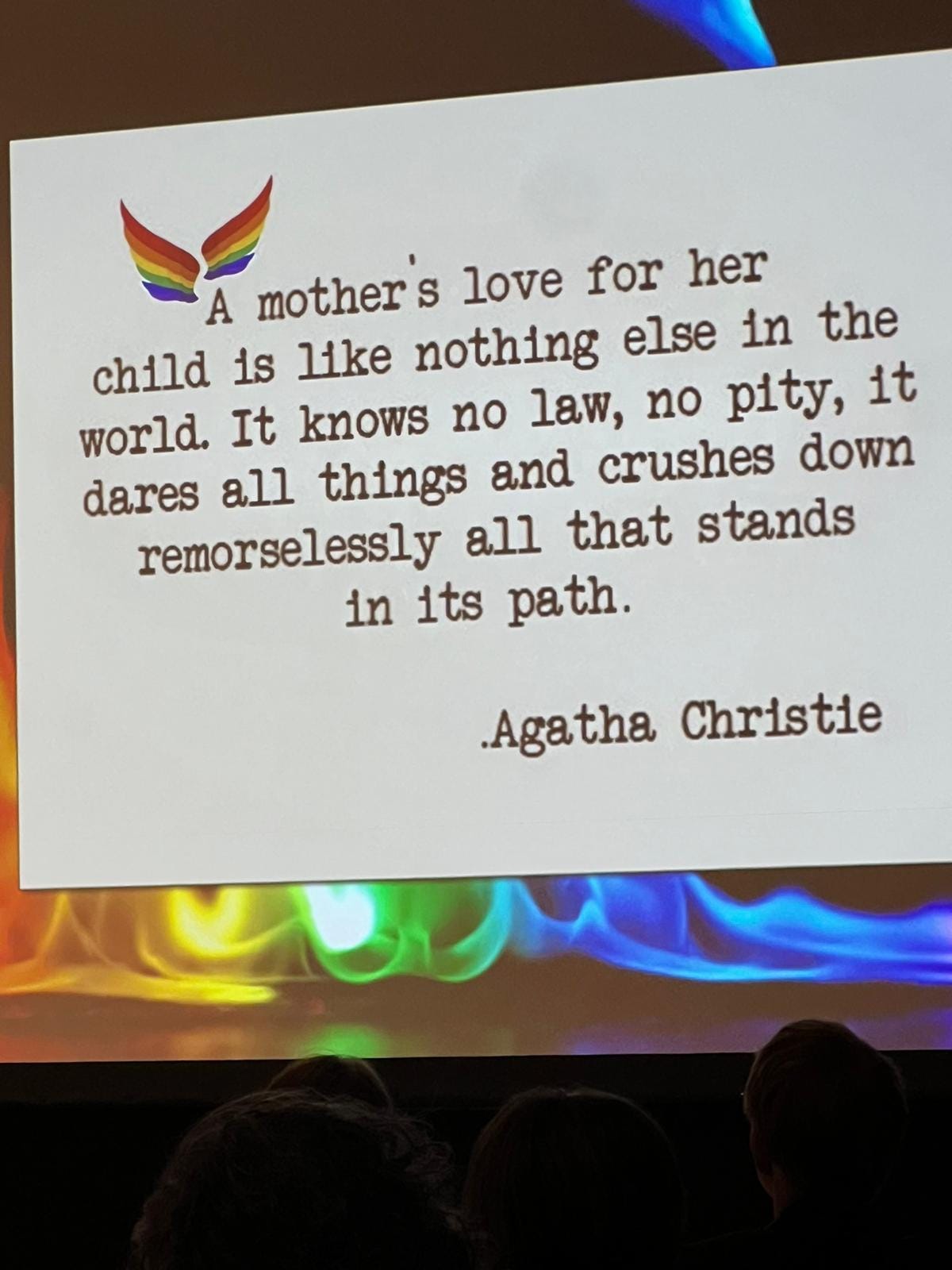Reflections on Lisbon
Insights and discussions from the recent Genspect conference, where professionals gathered to deepen understanding of gender dysphoria and evolving implications in clinical practice and in society
Carl Jung tells us that “Loneliness does not come from having no people about one, but from being unable to communicate the things that seem important to oneself, or from holding certain views which others find inadmissible.” People who have been touched by the trans phenomenon often feel isolated in their own communities, separated by a wall of information that is either ‘known’ or ‘not known’. When you know what’s going on, then you can’t help wanting to speak about it. If you don’t know it, then you can feel puzzled and irritated by the unexpected swerve your friend has taken into what seems like a sudden and inappropriate obsession with trans issues.
Although this coming-together isn’t the main reason for Genspect to hold conferences, yet it has proven to be an important aspect that helps with the often neglected well-being of those of us who have been swimming against the tide for far too long. And yes, the conference was, as we say in Ireland, “great craic”. This was despite a range of harrowing presentations – Emma Thomas’s presentation on the children of transitioners, for example, brought many of us to tears.
Life in 'genderland' is intense, so we certainly let off steam in the bar afterward. There's something uniquely powerful about connecting with people who genuinely understand the realities of trans ideology—it nurtures the spirit and deepens friendships. However, this camaraderie isn’t the primary reason Genspect holds conferences. Our conferences serve two main purposes: to illuminate the significant issues created by WPATH's approach to treating gender dysphoria and to promote a broader, more accurate understanding of the complexities surrounding this issue.

Gender dysphoria, although under-researched, is not any more unusual than a raft of other manifestations of distress that we humans turn to as we try to make sense of the world. WPATH, as the self-identified authorities on this subject, have made a mess of gender and their shoddy work has been completely discredited. It is little wonder that so many organisations are backing away from them.
At the Genspect conference in Lisbon, we tried to engage with the many problems associated with the gender-affirmative approach and fast-track medicalisation. It was heartening to see people disagree civilly and take different positions without collapsing in a heap. Of course there is a dearth of knowledge in this field and only snake-oil salesmen are wholly confident in their assessment of the field. Nonetheless it is clear that WPATH’s position is not helpful as WPATH colludes with the gender dysphoric individual that they can, in fact, become another person, with a new body and a different identity. WPATH promotes the weakening of healthy bodies through unnecessary, radical and reckless interventions.
Of course, many of the leaders of WPATH are gender dysphoric themselves and this is probably why they actively seek to enable fellow-sufferers. They wish to normalise their choices and convince the world that they had no other options. Other WPATH members are typically clinicians who have dedicated their careers to promoting the idea that altering a person’s body is a more effective treatment than addressing mental or emotional factors, despite the numerous challenges that arise as a result of this treatment. It’s difficult to row back from this position and most people seem to choose to double down instead.
Genspect does not agree with WPATH’s position; we do not believe that extreme body modification is an appropriate treatment pathway for a psychological condition. Instead we promote a non-medicalised approach to gender dysphoria that advocates for the least-invasive-first model of care. If WPATH were willing to listen to the many experts who have highlighted issues with their approach, Genspect wouldn’t need to follow them around the world, continually advocating for more realistic treatment options for gender dysphoria.
But they aren’t.
The gender critical movement is well-named though – we are a crowd that certainly believes in critical rigour. Some GCs tell me it is “mean” to follow WPATH across the world. These GCs believe we should play nicely with WPATH; that the only way we will achieve recognition is by pandering to their ideological stance. Maybe they’re right? Of course we welcome any and all thoughtful and constructive feedback.
However it cannot be ignored that WPATH are funded by a trans lobby who are determined to normalise a harmful treatment approach. This is akin to a group of wealthy anorexics promoting the necessity for liposuction, and providing technical detail about how best to achieve the most effective results, as well as utilising this time to address issues when the interventions go wrong, as they inevitably do.
That’s exactly what Marci Bowers did during the WPATH conference in Lisbon. Bowers, an AGP transwoman and president of WPATH, explained how he now recommends vulvaplasties instead of vaginoplasties as the preferred treatment option for gender dysphoric males as vaginoplasties are creating too many problems. Of course they are. Vaginoplasty is a failed medical intervention that should go the way of lobotomies and bloodletting (and, fyi, phalloplasties offer even worse results). Bowers recommending vulvaplasties as preferred treatment is a fitting reflection of the way WPATH seeks shallow, superficial solutions, without offering any depth at all. Vulvaplasties are simply more reckless irreversible interventions that have no supporting evidence and demonstrate the wild-west, ‘tooth fairy science’ that Helen Joyce spoke about so incisively at our conference in Lisbon.
WPATH is in disarray and so we were pleased that many members of WPATH chose to take us up on our offer of free tickets for WPATH participants to attend our conference. They came, and they were pleasingly enthusiastic when I asked what they thought of the presentations. These delegates spoke about their discomfort in the “cult-like” attitude in WPATH and wondered aloud why WPATH cannot handle any dissent. Our pleasure turned to horror, however, when myself and another Genspect associate met with WPATH clinicians during our time in Lisbon and heard how they have been offered 15-20% commission on referrals for surgery to private clinics in regions such as Georgia (of all places), Serbia and Thailand.
As the national clinics across the world are increasingly pulling away from gender-affirmative care, the private clinics are profiting from this shift. These consumer-driven, profit-making services have no interest in doing no harm – they prefer to let the buyer beware. And so they are now enticing mental health professionals across Europe with large amounts of money to approve inappropriate medical interventions.
Yes, you’re right, this is barbaric. Mental health professionals should never, ever be offered commission for providing approval for medical interventions. None of this is ethical. It is rabidly corrupt and mercenary. One day there will be a reckoning and I have no doubt that the gender affirmative approach will go the way of lobotomies and blood leeting.
It is time for professionals to begin to address the core issue – why would any clinician support a physical intervention that weakens the body and causes significant harm in the hope that it will alleviate a psychological condition?
Now that we are post-Cass, our perspective at Genspect is that we no longer need to search for scientific evidence to support this failed medical experiment. The jury is in and these medical interventions are evidently foolhardy and unjustifiable. We now need to move beyond research and into appropriate action. It is not helpful to create a body of research that inadvertently legitimises the profound failures of medical and academic rigour in this field. What we need instead are public awareness campaigns so that ordinary people can learn that medical transition is an inappropriate, radical and harmful intervention that causes a good deal more harm than good. Scurrilous private clinics in far-flung regions across the world would not be able to entice clinicians into commission-based approvals if there was sufficient awareness that the research already shows that there is no quality evidence to support medical transition.
At Genspect we view medical transition as some might view functioning alcoholism, functioning anorexia or functioning OCD – extremely difficult on everyone around the individual and often a self-made prison for the individual. There are much healthier ways to relieve dysphoria than medical transition.
The purpose of therapy in the context of gender dysphoria is to help the individual reconcile themselves with their body. Some people turn to obsessive-compulsive behaviour as a way of obtaining short-term relief from mental pain; these behaviours may create a feeling of control in a chaotic world. Others use extreme dieting to feel better, perhaps because it provides the dieter with a much needed feeling of power when we feel powerless. Drinking and/or taking drugs are popular short-term coping mechanisms. Chemical escape from the harsh reality of life can be very effective for some people, especially in the short-term. Self-harm is a relatively new dysfunctional coping method that provides some people with a much-needed feeling of release and also, at the same time, a symbolic gesture that accords with the fire that they feel going on in their brain. Gender dysphoria has recently emerged as a popular framework for people to manifest mental distress.
Medical transition offers the sufferer the notion that they can start again; they can become a new person, a different person, with a new life. It’s a heady promise and gender dysphorics cling to this dream with the grip of a drowning man – typically because they feel completely overwhelmed by life. It is the role of the responsible clinicians, professionals and institutions across the world to offer appropriate guidance and support to vulnerable people. The Genspect conferences offer a light of hope to those of us stuck in the weeds of gender. The wide range of expertise highlighted accurate, evidence-based information that added to our knowledge and understanding about this complex issue without seeking to pump people up with false promises. As the conference concluded, one thing was clear: our collective efforts to understand and address gender dysphoria are not just about treatment—they're about building a more compassionate, informed future for everyone affected.






After attending the Denver and Lisbon Genspect conferences, meeting you briefly, listening to all the podcasts of Gender: A Wider Lens, reading your book, and being inspired to write my own book, I must give my sincere thanks. You are stedfast in your focus, graceful in a hotbed of controversy, and you remain rational, compassionate and grounded.
This overview of the Lisbon conference is excellent, as was the conference itself.
As a parent of a trans-identified, medicalized adult child, I give voice to parents and also say, don't forget the twenty-something kids who check all the boxes of vulnerability and get swept up into gender ideology and medicalization. These older kids need protections and comprehensive care too.
Just because my kid is over 18 doesn't mean that altering her body to try and fix mental and emotional issues is okay. My daughter's breasts, now gone, were not the problem!
Please keep writing, interviewing diverse individuals on your podcast, and hosting conferences. By the way, where and when in the next conference?
Stella this is so well written, thank you. As a parent of a late transitioning son I really appreciate the first paragraph. You really nail the experience of parents of adult transitioners who are now in exile. Such angst and pain and loneliness we feel. Thank you.